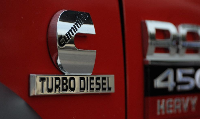NotChargingToyhauler
#1
have the 2008 dodge 3500 4x4 ram 6.7 diesel. i get to the sand dunes which is 2 hours of charging and batteries are more discharged than when i left. i leave with full charge and seems I get there and down on charge. i have already checked the #9 30 amp cartridge fuse and it is ok. any other ideas or suggestions? thanks
#4
I checked it yesterday for fun. the 1-2 o 'clock position male thingy is hot on the 7 pin connector is hot, so it must be the converter or whatever in the toyhauler than doesnt work to full capacity or something. Ive been told that these converters only charge a a slow 1-3 amps so takes hours and hours to charge toyhauler batteries. anyone heard different or still have suggestions? thanks
#5
Your truck is not going to charge the batteries in your hauler, it will maintain what you have at best. Most systems come with a trickle charger system for batteries, so if you leave to go camping and you're batteries are already drained, they'll still be drained when you get where ever you're driving too.
#6
That's not true !. I have pulled campers for many years and they have always charged.Many years ago with our first camper the battery would be almost dead when we left home.By the time we arrived at the lake the battery was fully charged. We went to Alaska last year and the battery always stayed charged,even when we dry camped for a night the truck charged the battery!.
#7
I checked it yesterday for fun. the 1-2 o 'clock position male thingy is hot on the 7 pin connector is hot, so it must be the converter or whatever in the toyhauler than doesnt work to full capacity or something. Ive been told that these converters only charge a a slow 1-3 amps so takes hours and hours to charge toyhauler batteries. anyone heard different or still have suggestions? thanks
http://rvbasics.com/techtips/rv-trav...ug-wiring.html
Trending Topics
#8
Agree with RAM GUY 04. At times I've had to run the truck just to charge the camper batteries. Not a very efficient generator but works in a pinch.
All battery charging requires good connections. When your using the current from the battery, the difference in potential is 12v, ie the 12V battery to ground. However, when charging the difference in potential is about 2 volts. The alternator is regulated to somewhere between 13.5 and 14.5. Since even a low battery will still show close to 12 volts, you're only pushing the current with around 2 volts. Check all the wiring for corrosion. Can be anywhere along the line but most likely at the camper battery terminals. Also check the battery to trailer ground connections.
All battery charging requires good connections. When your using the current from the battery, the difference in potential is 12v, ie the 12V battery to ground. However, when charging the difference in potential is about 2 volts. The alternator is regulated to somewhere between 13.5 and 14.5. Since even a low battery will still show close to 12 volts, you're only pushing the current with around 2 volts. Check all the wiring for corrosion. Can be anywhere along the line but most likely at the camper battery terminals. Also check the battery to trailer ground connections.
#10
One other point, the charging we're talking about is direct from the tow vehicle to the trailer batteries. It's a DC path all the way. The comment above about converter charging at a very low rate is true but that item is only in play when connected to an AC source, ie plugged into commercial power or a generator. The purpose is to convert the AC to DC that both charges the batteries and provides power to those items opperated by DC voltage. The output from the converter to the batteries is kept low intentinally to avoid boiling the batteries dry during long periods of connection to commercial power.



